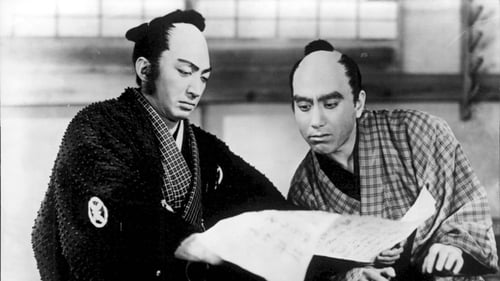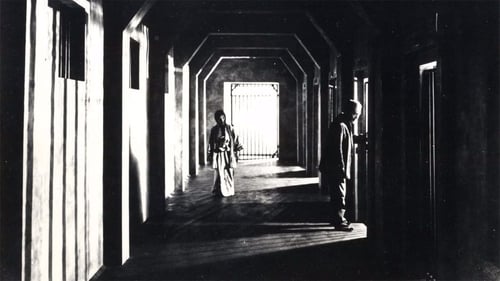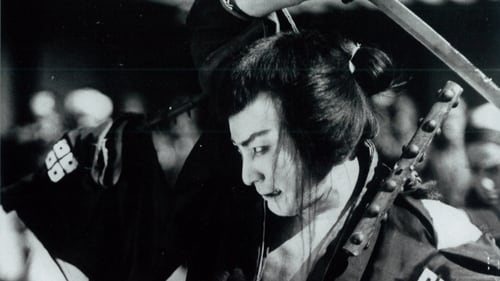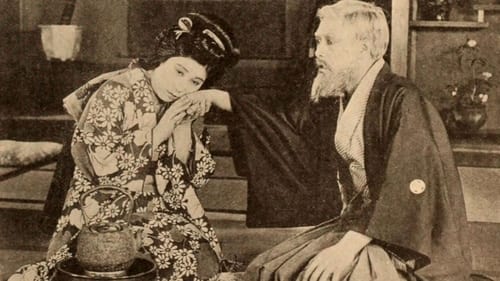
A nurse's tale of self-sacrifice during wartime. The title is borrowed from a patriotic song made popular by singer Hamako Watanabe during the Second Sino-Japanese War.

Sabaemon of Irifuneya
A samurai is ordered by his lord to go to Edo and investigate the truth behind the rumor of a rebellion against him.

dir: Teinosuke Kinugasa

old man Tsuchibu
An onnagata (female impersonator) of a Kabuki troupe avenges his parents' deaths. Remade in 1963 as Yukinojô Henge.

Period film from 1934.

A mournful masterpiece by Kinugasa Teinosuke


Koyama
This 1932 adaptation is the earliest sound version of the ever-popular and much-filmed Chushingura story of the loyal 47 retainers who avenged their feudal lord after he was obliged to commit hara-kiri due to the machinations of a villainous courtier. As the first sound version of the classic narrative, the film was something of an event, and employed a stellar cast, who give a roster of memorable performances. Director Teinosuke Kinugasa was primarily a specialist in jidai-geki (period films), such as the internationally celebrated Gate of Hell (Jigokumon, 1953), and although he is now most famous as the maker of the avant-garde silent films A Page of Madness (Kurutta ichipeji, 1926) and Crossroads (Jujiro, 1928), Chushingura is in fact more typical of his output than those experimental works. The film ranked third in that year’s Kinema Junpo critics’ poll, and Joseph Anderson and Donald Richie noted that 'not only the sound but the quick cutting was admired by many critics.

Osuga
In medieval Japan, a brutal and corrupt magistrate is planning to kill the child who is about to become the heir to the estate and position of the local lord and substitute his own "heir", an orphan, in order to get control of the late lord's estate and rule as the impostor's "regent". However, a mysterious stranger appears and sets out to thwart the magistrate's plans and free the people from his oppressive rule.

Old Man Renting Second Floor
江戸の裏町でひっそりと暮らす姉弟。弟はある女をめぐり傷害事件を起こしてしまう。一方姉は借金返済に身売りの話を持ちかけられ

Hamamatsuya Kobe
First film adaptation of the kabuki play Benten Kozo, about a thief who steals from the rich and gives to the poor...

Doctor
A man takes a job at an asylum with hopes of freeing his imprisoned wife.

Hyozan Matsusumi
阪東妻三郎の無声映画時代を代表する傑作チャンバラ時代劇。実直な道場の師範代が善意で行動したことが誤解され、友人にも裏切られ浪人にまで落ちぶれる。やがて追い詰められた彼は、怒りを爆発させ、追手を斬って斬って斬りまくる。

This is a classic Japanese Ghost Story.

Pai Wang
The Vermilion Pencil is a 1922 American silent drama film directed by Norman Dawn, and produced and distributed by Robertson–Cole. It is based on the eponymous 1908 novel by Homer Lea. The film stars Japanese actor Sessue Hayakawa in multiple roles, and white actors Ann May, Bessie Love, and Sidney Franklin, all in Asian roles. It is now a lost film.

Chung Wo Ho Kee
The Chinese prince T'Su Wong Shih loves Quan Yin, the daughter of a gardener, but his uncle wants him to marry a girl of his own class. Leaving to study in the United States, the young man promises his beloved that they two will be together soon. Having finished university, one day T'Su Wong Shih visits the market of San Francisco, and at an auction of slaves, he finds Quan Yin auctioned. To save her, he agrees to pay a price of five thousand dollars but, not possessing the full amount, he makes a deal with the auctioneer for a three-year extension in which he must work to raise the money needed to rescue the girl. T'Su Wong Shih has no great success until he manages to win a large sum in a lottery. However, Quan Yin is now in danger because a Chinese gangster wants to have it and, to do that, goes to threaten the auctioneer who is forced to comply. T'Su Wong Shih is then engaged in a struggle to liberate his beloved: he defeats the gangster, rescues Quan Yin and claims her as his...

Yuki's Father
While attending college in Washington, D.C., Yuki Onda, the daughter of a Japanese samurai, meets and falls in love with Pierre Le Beau, a diplomatic attaché. At the outbreak of the Russo-Japanese War, Pierre is sent to Japan as attaché to the Australian ambassador. When Yuki's father discovers his daughter's romance with a foreigner, he becomes enraged and betroths her to Prince Hagane for political reasons.

Goro
Yano is a small delivery boy for his uncle, who keeps a curio shop in Chinatown. His loves are Tama, his sweetheart, and Bengi, his dog. Bengi is seized by dog catchers, but is rescued by Letty Stanford, for which Yano promises his fealty. Later Letty is kidnapped by Germans because of her war activities, and it is Yano who goes to her rescue and gets her free in spite of his diminutive size. The Little Japanese has paid his debt.










